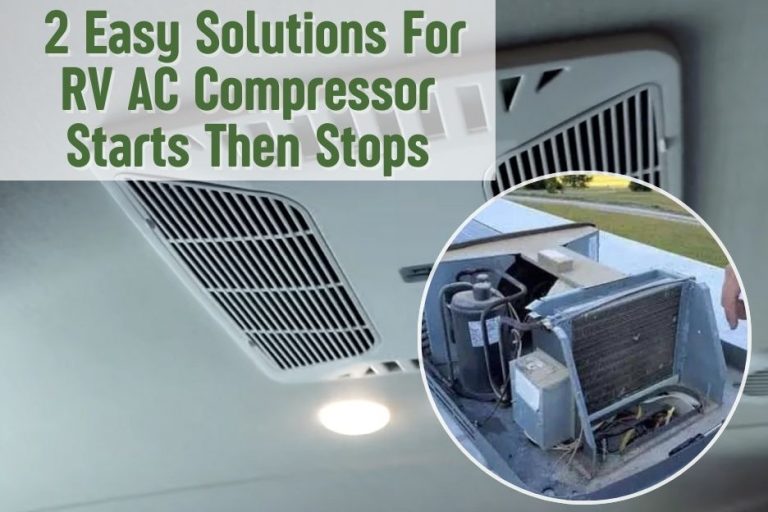What Generator Size is Needed to Power an RV Air Conditioner?
On average, to power an RV air conditioner, you will need a generator that should range between 2000W to 4000W. But there are various other factors that you need to consider.
You have to take into account the surge watts and the running watts of your air conditioner, as well as any other appliances and devices that you will be running on it.
For example, your AC or any other appliance needs surge watts to power up and running watts to operate. These are the two ratings that you need to keep in mind when making your decision.
Here we are going to discuss all these aspects in detail.
Table of Contents
How do Generators work with AC Units?
A generator unit has a stored amount of energy in it. Therefore, whenever you run an appliance on it, you take a portion out of the allotted power that you can use within a period.
If you run other appliances on it, it will increase the amount of energy that you take out. That portion will not be available for you to use until you turn some of the appliances off. Apart from that, these RV generators come with two different measurements.
These are the surge watts and running watts like we mentioned in the beginning. “Surge watts” is the bigger number, and your unit will need much more energy to start up than what is required to keep it running (the running watts).
Once the unit is powered up, some of the watts will go back to the generator unit. For example, a 2000W generator can power up an AC that comes with a surge watt rating of 1800W and a running watt rating of 650W. So, you will be left with 1350W of power that you can use to run other appliances in your recreational vehicle.
Keep in mind that you always go for a generator that comes with a capacity that is much more than what you will need, including the requirements of powering your RV air conditioner.
Otherwise, you won’t have any leftover energy to power other appliances apart from your RV AC. This buffer needs to be at least 200W to 400W.
Calculating Your Specific Needs
To deal with your start and running watt requirements, you need to understand watts, volts, amperes, and BTUs. In addition, there are BTUs mentioned for the air conditioners, which are British Thermal Units, and they make calculations relatively easy.
You will only need to know the generator capacity for your AC, and all will be fine. But, for the rest of the appliances, you will have to know their wattage ratings. And if there are no wattage ratings, you will have to convert them from the voltage and amperage numbers given in their manuals.
A product of voltage and amperage will give you wattage, and this way, you can calculate the running and surge watts of other appliances. The following table will provide you with a bit of heading for choosing the right generator wattage requirement.
| Room size | Area | BTU required | Generator capacity |
| 20 ft x 30 ft | 600 square feet | 14,000 BTUs | 3000W to 3200W |
| 20 ft x 20 ft | 400 square feet | 12,000 BTUs | 2600W to 2900W |
| 15 ft x 20 ft | 300 square feet | 10,000 BTUs | 2200W to 2600W |
| 10 ft x 20 ft | 200 square feet | 8,000 BTUs | 1400W to 2100W |
Most generators can power up your RV air conditioner. So, that shouldn’t be your real concern. Instead, you need to worry that you should go for a unit that you can conveniently use to power your RV AC and other appliances.
How to Get the Most Out of Your Generator While the AC is On?
To get the most out of your generator, you need to consider that optimizing resources is always the best option. In addition, you are enjoying nature outdoors, so it’s best to preserve that nature as well.
So, it’s better not to run your AC all the time and only use it at certain times of the day. Also, make sure not to run it at full power at all times. The best practice is to run it when you know that you will spend more time in your RV. This way, you will be able to conserve a lot of your energy and cost as well.
Make sure that you clean your C filters and check the fluids in your generator as well. Also, don’t keep your AC unit working all the time, or it won’t last long. Don’t just turn the temperature down and turn the fan on to circulate the air.
Also, make sure not to use the power boost of your AC for short periods, or it will wear your AC down. And if you are not using something, then unplug it.
How Many Watts Does an RV AC Use?
It all depends upon the BTUs that your AC comes with. If it’s a 14,000 BTU AC, then a 3000W to 3200W generator can power it conveniently. For a 12.000 BTU RV AC, a 2600W to 2900W generator will suffice. If you have a 10,000 BTU RV AC, it will need a 2200W to 2600W generator, and for an 8,000W RV AC, a 1400W to 2100W unit will work quite fine.
But you also need to keep in mind what other appliances you will be connecting with your generator. The wattage rating for those units must be maintained in mind as well. For instance, a fridge is going to need 700W, while a coffee maker will need 1000W.
A phone charger will run on 10W, while a toaster will need 850Watts. There are other appliances as well that come with different wattage ratings as well. These include microwave (650W), VCR (100W), lightbulb (60W), dishwasher (1500W), and similar other appliances. You need to keep in mind the appliances that you will be running on your generator in addition to the air conditioner.
Which Generator Will Run My RV Air Conditioner?
There are various options that you can try. If you are going for a low-end option, 400W to 800W units are available. If you are going for high-end options, you can use units that can range from 3400W to over 4000W.
In most cases, these units will be portable, but they do pack quite a punch. A unit that ranges between 2000W to 2500W is a safe bet and will work well to meet most retirements. Of course, you can conveniently run a 10,000 BTU RV AC with it along with some other appliances too.
Will a 3500-watt generator run an RV air conditioner?
A 3500W generator is a powerful unit, and it can efficiently run a 14,000 BTU RV AC along with a range of other appliances and devices. So, this unit will work well in most RVs, even the ones that are large.
And you will still have some energy in store that can power up other appliances too. But, of course, it all depends upon what BTUs your AC has and what you will power with your generator. But a 3500W generator is more than sufficient for most RV applications.
FAQs:
What to look for in an RV generator?
You need to make sure it has enough capacity to power your RV AC and still run other appliances. You need to add up the overall wattage of your AC and other appliances and get a sum.
Your generator’s overall capacity should be greater than that sum. The rest of the features like easy mobility, fuel type, and others come secondary.
How much power do you need with AC?
You need to check the BTUs of your AC. a 14,000 BTU AC can be powered with a 3000W to 3200W generator. An AC that is as tiny as 8000 BTUs can work with a 1400W to 2100W generator. It’s all about what else you are going to power alongside your AC.
How to calculate watt usage?
It’s pretty simple as most of the appliances come with their wattage rating in their user manuals. If yours didn’t have any wattage rating, you would find the numbers associated with its voltage and amperage.
You will only have it multiple the starting voltage with the starting amperage and running violate with the running amperage to get the unit’s starting wattage and running wattage.
How to estimate your AC power consumption?
A ton of cooling equals 1000W; therefore, 1.5 tons of cooling means your AC is 1500W, 2 tons of cooling means 2000W, and so on. Now, 1 ton equals 12,000 BTUs which means 24,000 BTU units means that it is 2 tons. So, 1 ton of cooling is 1000W and 12,000 BTUs.
How are BTUs and wattage related?
BTU is a unit of energy, while wattage is the rate at which power is transmitted. So, they do relate with each other, but they don’t equate to a similar number.
Conclusion
There are different generator sizes available on the market, and you can pick the right one based on the starting and running watts of your RV AC. Get a big enough generator to power something alongside your RV AC to get the most out of it.

I`m a current Law Enforcement Officer working within the Counterterrorism Bureau in New York State. I have been Camping for over 20 years. My styles of camping include tent, car, truck, van, and RV travel trailer. I have a YouTube channel where I teach all types of camping with an entertaining method: https://youtube.com/@TheSmallsRVAdventures

![How to Winterize a Camper? [Actionable Tips]](https://camperlife.co/wp-content/uploads/2021/03/screen_2x-1-768x514.jpg)



